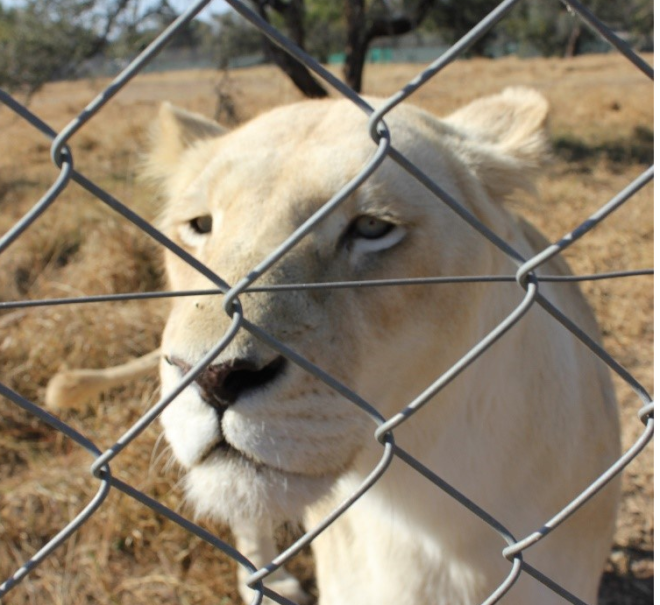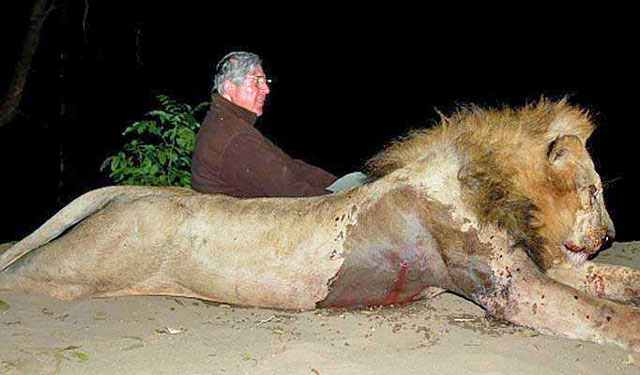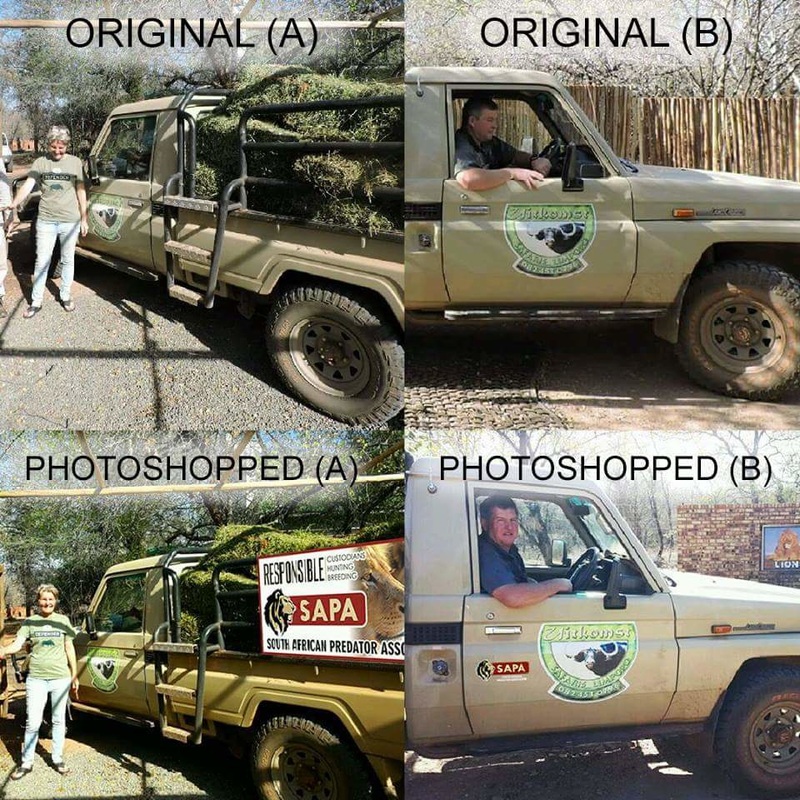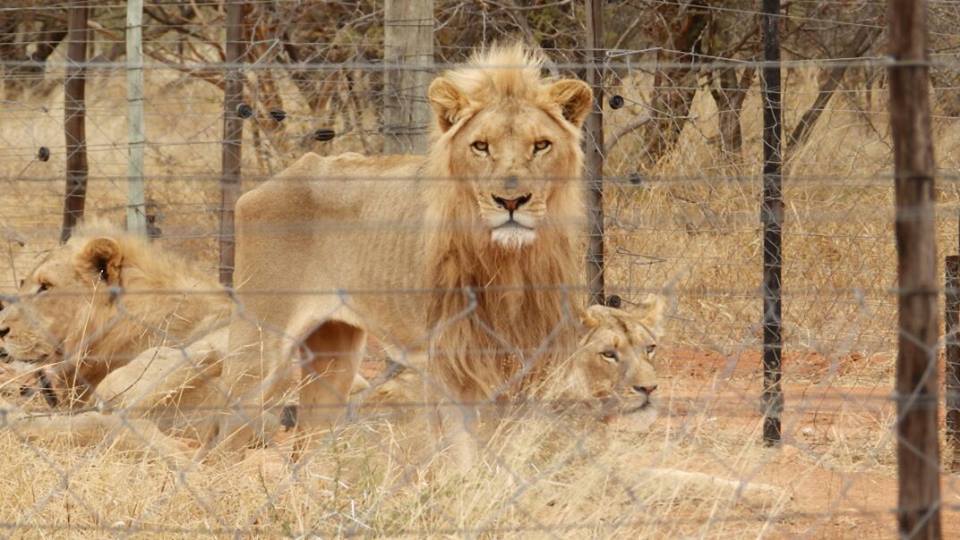Banner image: courtesy of Campaign Against Canned Hunting article
‘Canned’ Phase Out
We have seen the acknowledged damage being done to South Africa’s reputation from its continued harbouring of ‘canned’ practices. The ‘canned’ industry is in steep decline (with a reported 70% drop in the ‘appetite’ for ‘canned’ executions of bred stock).
Figure 1 – “Sir David Scholey and his trophy lion execution” – pictures-of-cats.org
Captive breeders are openly offering lion cubs for sale on facebook (Otavi Lion Park), but with the dubious reassurance that the cubs will only be sold to licensed facilities; not that this is much reassurance even if it is true – where the cubs might be sold onto next (and the paper trail obfuscated) is anyone’s guess.
So what happens next if ‘canned’ is indeed declining towards an ‘end game?’ Chris Mercer (Campaign Against Canned Hunting) has released a video, where he eloquently outlines his thoughts on the likely scenario that could unfold in South Africa:
Video 1 – The phasing out of ‘canned’ lion breeding by Chris Mercer, Campaign Against Canned Hunting
So, the points we can take away from Chris’s message are:
- There is no realistic prospect of the release into the wild of the 7,000 – 8,000 captive lions held in ‘canned’ facilities in South Africa;
- The mass euthanasia of the captives in the short term is improbable;
- The prevention (banning) of further expansion of ‘canned’ stock must be implemented – continued breeding for breeding’s sake of ‘stock’ makes no economic (or moral sense) for anyone concerned;
- ‘Ethical’ hunting associations have a key role to play here – I am thinking the Professional Hunters’ Association of South Africa (PHASA) has taken a vital stance, as of November 2015 which should be widely welcomed against ‘canned’ hunting and predator breeding (though it must be noted, that the PHASA’s stance is somewhat ‘late’ seeing as how ‘canned’ has perpetuated for some 25 years within the PHASA’s remit);
- The South African Government (Minister of Environmental Affairs, Edna Molewa) needs to take some kind of stance, if the ‘canned’ phase out is to have a humane and orderly progression – however, no Government outright ban will be forthcoming, as this would expose the Government to claims for compensation for closing down the ‘canned’ industry the South African Government has clearly allowed to manifest (thereby tacitly supporting the ‘canned’ industry to the point of complicity);
I agree with the ‘canned’ phase out approach advocated (Chris Mercer (CACH), LionAid, Blood Lions etc.)
- No release into the wild – Many ‘canned’ animals are hand reared and fed, often poorly bred from a limited gene pool (ie. genetically mutated) and not in strong enough health to survive in the wild. Lions exist in strong pride structures. Any disruption to a given pride, or territory disputes between an established pride and a ‘new’ pride can be devastating. So, the chances of any successful, or risk free reintroduction of any ‘canned’ (or indeed “ranch” stock) into the wild is pure fantasy;
- No mass euthanasia – Not likely when the ‘stock’ potentially has some cash-out value to the breeder, either as cannon fodder for so-called hunters, and/or lion bone trade to Asia (with CITES Permit complicity);
- A halt to continued ‘canned’ breeding – When it comes to the phasing out of ‘canned’, how will any ‘ban’ on breeding of further ‘canned’ stock happen and the end game pan out do you think? Will the lion farmers:
a. Just be forced to separate out the males and females;
The lion breeders will separate the males and females, probably with a preference for euthanizing the females (with CITES permits ‘obtained’ to profit from bone trade to Asia etc.) and selling off the males for trophies as the industry winds down.
b. Or, would there need to be a mandated ‘canned’ lion contraception programme? The fact that the majority of the ‘canned’ captive stock is held in small cages makes separation out more likely, but in some scenarios, perhaps a contraception programme might be necessary (?). I believe this is not an inexpensive option, as based upon Bubye Valley Conservancy (B.V.C) discussion of the ‘surplus 200 lions’ earlier in the year out of a B.V.C claimed stock of 500 lions:
Paul Bartels, a wildlife scientist from South Africa’s Tshwane University of Technology, said female contraceptive implants used in smaller reserves would be impractical for Matilda’s (B.V.C) clan:
“There are a lot of lions on that [Bubye] conservancy. It would cost hundreds of thousands of dollars for contraception to make any real difference,” he said (Daily Telegraph, 20 February 2016).
I wonder how the costs and implementation of any captive lion contraception programme necessary [assuming it’s necessary] will be met? I doubt the lion breeders will dent their own wallets, but they will expect compensation for any such scheme (which means actual South African authority intervention, mandated action and funding – how likely is that?).
c. Sneak lions out to zoos, ‘enthusiasts’ etc.:
– Leon de Swardt “is a South African based lion breeder and animal broker” reportedly selling “to international buyers, many from Pakistan, who are interested in buying lions, tigers and other animals;”
– Otavi Lion Park is openly trying to sell lion cubs via facebook – despite reassurances that they will only sell to “licensed” facilities, there is little comfort that an onward secondary market devoid of any legitimate paper trail will emerge;
– I suspect these examples are just the tip of the iceberg……
4. ‘Ethical’ hunting associations have a key role – The PHASA needs to not just see through on its stated pledge to discipline any errant members that continue to support or indulge in ‘canned.’ But more than that, the PHASA needs to take an active leadership role in restoring any reputation to ‘hunting’ in ensuring the inevitable read-across of an ugly implosion of ‘canned’ is mitigated in the PHASA’s own self-interest – the PHASA can not conveniently disassociate itself from ‘canned’ as of November 2015 after decades of prior endorsement.
5. What incentive is there for any South African Government intervention? – Well there is South Africa’s general tourism reputation (and its $9.5bn (2012) income) at stake. What will that reputation look like if the South African Government continues to stand aside like a bewildered on-looker, but with the complicit blood still dripping from its hands as the ‘canned’ captives perish?
What are the ‘Canned’ Breeding and Hunting Advocates Doing?
Of course, there are those (South African Predator Association (SAPA), SCI, DSC….) that still advocate for ‘canned’ (sorry “ranch”) breeding of big cats to continue to ply its unethical, immoral and unregulated trade for profit from animal exploitation.
The SAPA has a poor reputation for integrity and clear thinking when it comes to their advocacy for ‘conservation’ and ethical behaviour, with desperate, fumbled attempts to garner ‘good’ publicity/support (and failing):
- Update (16 September 2016): The third party accusations previously made and repeated in this article have been strongly denied. The third party source is apparently reinvestigating – in the meantime the accusations have been removed.
- In a recent (August 2016) ‘attempt’ at good PR, the SAPA highlighted its efforts to save drought stricken animals of Marloth Park. However, Allison Fitzgerald (organizer and feed coordinator for the Marloth Wildlife Fund) has since explained that she had received a phone call from a farmer who said his driver was en-route to Marloth with a bakkie [truck] load of feed for the rhino:
“At no time did anyone identify themselves as representatives of SAPA or any predator association” Fitzgerald said. After the feed had been delivered, and the bakkie had departed, she was later astonished to be notified of the claims on the lion farmers’ SAPA website, alleging its members and the Predators association had saved drought-stricken rhinos at Leeuspruit.
Fitzgerald reacted strongly, stating on social media stating “We would like to distance ourselves from reports that we are assisted by SAPA (SA Predator Association) At no time did Ian Otto identify himself as having any connection to them. We were contacted by him to say they were bringing 29 bales donated from a Lucerne farmer who had read the story in the Beeld. The vehicle had no sign or identification of SAPA and we strongly deny the report that they claim to have saved the Rhino. It is nothing more than a cheap publicity stunt” Fitzgerald wrote – CACH, 12 August 2016.
Figure 2 – The SAPA also posted ‘photo-shopped’ pictures of the anonymous ‘bakkie’ used in the dupe (sorry, attempted good PR stunt) on Marloth Wildlife Fund – CACH
Update: “SAPA clarifies its clear-cut regulations after being shamed for ‘ publicity stunt’,” Traveller24 News, 17 August 2016
Conclusions
How will a phase out ‘work’ and be humanely possible for all 7,000 – 8,000 suspected captives is debateable without an orderly (ie. Authority) intervention from outside the ‘canned’ industry. With no such intervention, I think we will see many more desperate and cruel Walter Slippers’ type scenarios unfold.
Figure 3 – Image from Walter Slippers’ breeding facility, July 2016
Walter Slippers (Leon de Swardt and others) hold onto the delusion that predator breeding is no different from raising sheep herds (“what is all the fuss about?“) and it’s the “antis” that have ‘forced’ them to desperate measures – of course, there are always less morally reprehensible ways to make a living and ‘canned’ is long overdue to become a failed business model relegated to the past:
Of course for anyone capable of rational thought, there is a clear distinction between ‘domesticated’ herds (cows and sheep in a field happily eating grass) and iconic wildlife species that have complex societal structures and bonds, strong territorial instincts and dynamics, want/need to roam (hunt prey in the case of lions) etc….confinement and human management does not suit them. Plus, once an iconic wildlife species is demeaned to mere ‘commodity’ (as per ‘domesticated’ herds) then the wildlife’s appeal as a tourist highlight in country is diminished – damaging brand South Africa Tourism.
If [when!] the African lion is ‘Uplisted’ to CITES Appendix I later this year, this will make any ‘legal’ trade much harder (in theory). Unfortunately, the likelihood is any ‘Uplisting’ will be watered down:
“The more likely outcome is that western and central African lions are placed on Appendix I, while other populations remain on Appendix II. This is the same sort of scenario applying to rhino and elephant populations in Africa” – LionAid, 5 May 2016
This watering down is supported by the European Union it seems:
“Recognizing nonetheless that most Western and Central African populations meet the criteria for listing in Appendix I, the Union would be supporting a split-listing whereby the African population of the species could be transferred to Appendix I, with exclusion of certain Southern and possibly Eastern African national populations” – European Commission, COM(2016) 437 final, ANNEX 2 – page 11, Proposal 4, 1 July 2016
The International Union for Conservation of Nature’s (IUCN’s) Motion 009 (“the prohibition by the South African Government on the capture of wild lions for breeding or keeping in captivity“) is due for debate at the forthcoming IUCN World Conservation Congress, 1 – 10 September 2016:
IUCN Motion 009 – “Terminating the hunting of captive-bred lions (Panthera leo) and other predators and captive breeding for commercial, non-conservation purposes” – “NOTING that the great majority of hunters regard ‘canned hunting’ as an ethically repugnant embarrassment” – IUCN’s Motion 009
So, perhaps the IUCN are soon to vocally add their support for the ending of ‘canned.’
Update, 4 September 2016 – The Republic of South Africa, Department: Environmental Affairs issues a defiant statement in response to the IUCN’s motion – “However, South Africa, cautions against assumptions that the adoption of this motion will result in the shutting down of facilities.”
The realisation of ‘canned’ supporters to actively contribute ‘positively’ to the inevitable end game of ‘canned’ is not expected anytime soon; but that end game is looming whether they like it, or not.






